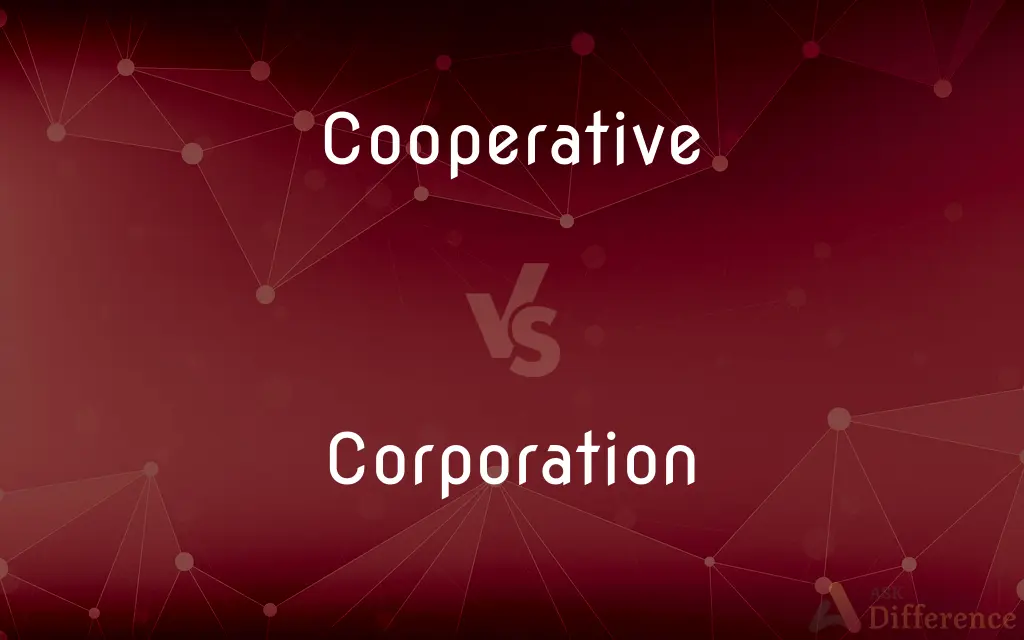Cooperative vs. Corporation — What's the Difference?
By Maham Liaqat & Fiza Rafique — Updated on April 23, 2024
A cooperative is a member-owned business entity with democratic control, while a corporation is owned by shareholders and prioritizes shareholder profits.

Difference Between Cooperative and Corporation
Table of Contents
ADVERTISEMENT
Key Differences
A cooperative operates on the principle of democratic member control, often adhering to the philosophy of one member, one vote. Whereas a corporation is structured around shareholder equity, where decision-making is influenced by share ownership.
Profits in a cooperative are usually distributed among the members based on their usage or contribution, rather than on investment size. On the other hand, corporations distribute profits in the form of dividends based on the number of shares each shareholder owns.
Cooperatives are formed to meet the mutual needs of members and are generally more focused on service than profit. Corporations, however, are established with the goal of maximizing profits for shareholders, which can sometimes lead to prioritizing profit over community or employee benefits.
Governance in cooperatives involves member-elected directors who manage the cooperative’s affairs in a way that benefits all members. In contrast, corporations have a board of directors elected by shareholders to protect their interests and maximize shareholder value.
The legal and tax obligations for cooperatives can be more favorable, as some jurisdictions offer benefits aimed at promoting cooperative business models. Corporations, however, often face a more stringent regulatory environment and are taxed on their profits.
ADVERTISEMENT
Comparison Chart
Ownership
Owned by members who use its services.
Owned by shareholders who invest capital.
Control
Democratic, typically one member, one vote.
Based on share ownership; more shares, more votes.
Profit Distribution
Based on usage or contribution.
Based on the number of shares owned.
Primary Objective
Serve the needs of its members.
Maximize profits for shareholders.
Legal Structure
Varies, often less regulated than corporations.
Heavily regulated, distinct legal entity.
Compare with Definitions
Cooperative
An organization that operates for the benefit of those using its services.
A housing cooperative provides affordable living options for its members.
Corporation
A company or group authorized to act as a single entity and recognized as such in law.
The corporation issued shares to raise capital for expansion.
Cooperative
A legal entity with less emphasis on capital investment for profit.
A credit union cooperative offers financial services with lower fees to its members.
Corporation
An organization where stakeholders invest money for a financial return.
Shareholders expect dividends from the corporation’s profits.
Cooperative
A business entity owned and democratically controlled by its members.
A local food cooperative distributes profits based on how much each member shops.
Corporation
Designed to maximize shareholder wealth, often at large scales.
The corporation’s board introduced a new strategy to increase market share and profitability.
Cooperative
A model prioritizing service over profit, reflecting member interests.
A farmer’s cooperative focuses on getting the best prices for its members' products.
Corporation
Features a hierarchical structure with a board of directors and executive management.
The corporation’s CEO reports to a board that represents the shareholders' interests.
Cooperative
A group of people acting together to meet common economic, social, and cultural needs.
Artists form a cooperative to share the costs of a studio space.
Corporation
Legally a separate entity from its owners, liable for its actions and debts.
The corporation can enter into contracts and own property independently of its owners.
Cooperative
A cooperative (also known as co-operative, co-op, or coop) is "an autonomous association of persons united voluntarily to meet their common economic, social, and cultural needs and aspirations through a jointly-owned enterprise". Cooperatives are democratically owned by their members, with each member having one vote in electing the board of directors.
Corporation
A corporation is an organization—usually a group of people or a company—authorized by the state to act as a single entity (a legal entity recognized by private and public law "born out of statute"; a legal person in legal context) and recognized as such in law for certain purposes. Early incorporated entities were established by charter (i.e.
Cooperative
Done in cooperation with others
A cooperative effort.
Corporation
An entity such as a business, municipality, or organization, that involves more than one person but that has met the legal requirements to operate as a single person, so that it may enter into contracts and engage in transactions under its own identity.
Cooperative
Marked by willingness to cooperate; compliant
A cooperative patient.
Corporation
Such a body created for purposes of government. Also called body corporate.
Cooperative
Of, relating to, or formed as an enterprise or organization jointly owned or managed by those who use its facilities or services
A cooperative department store.
Cooperative apartment buildings.
Corporation
A group of people combined into or acting as one body.
Cooperative
An enterprise or organization that is owned or managed jointly by those who use its facilities or services.
Corporation
(Informal) A protruding abdominal region; a potbelly.
Cooperative
A building or complex in which the residents buy shares of stock in a building corporation and are given a lease to a specific apartment.
Corporation
A body corporate, created by law or under authority of law, having a continuous existence independent of the existences of its members, and powers and liabilities distinct from those of its members.
Cooperative
An apartment in such a building or complex.
Corporation
The municipal governing body of a borough or city.
Cooperative
Ready to work with another person or in a team; ready to cooperate.
The patient was rarely cooperative, and tended to refuse treatment.
Corporation
(historical) In Fascist Italy, a joint association of employers' and workers' representatives.
Cooperative
Involving cooperation between individuals or parties.
A cooperative game
A cooperative business enterprise
Corporation
A protruding belly (perhaps a play on the word corpulence).
Cooperative
Relating to a cooperative or cooperatives.
Corporation
A body politic or corporate, formed and authorized by law to act as a single person, and endowed by law with the capacity of succession; a society having the capacity of transacting business as an individual.
Cooperative
A type of company that is owned partially or wholly by its employees, customers or tenants.
Corporation
A business firm whose articles of incorporation have been approved in some state
Cooperative
Operating jointly to the same end.
Corporation
Slang terms for a paunch
Cooperative
A jointly owned commercial enterprise (usually organized by farmers or consumers) that produces and distributes goods and services and is run for the benefit of its owners
Cooperative
An association formed and operated for the benefit of those using it
Cooperative
Involving the joint activity of two or more;
The attack was met by the combined strength of two divisions
Concerted action
The conjunct influence of fire and strong dring
The conjunctive focus of political opposition
A cooperative effort
A united effort
Joint military activities
Cooperative
Done with or working with others for a common purpose or benefit;
A cooperative effort
Cooperative
Willing to adjust to differences in order to obtain agreement
Common Curiosities
How do voting rights differ in cooperatives and corporations?
Voting in cooperatives is generally democratic, one member-one vote, regardless of investment size; in corporations, voting power is proportional to the number of shares owned.
What is the main purpose of a cooperative compared to a corporation?
A cooperative aims to serve the needs of its members, while a corporation focuses on maximizing shareholder profits.
How do the profit motives differ between a cooperative and a corporation?
Cooperatives distribute profits based on members’ contribution or usage, while corporations distribute based on investment.
Can a cooperative become a corporation?
Yes, a cooperative can decide to restructure itself as a corporation if its members agree to change the business model.
Can both cooperatives and corporations issue shares?
Cooperatives can issue shares, but these often do not represent equity as in corporations; instead, they might represent membership or a patronage refund.
Which entity is better for small business owners?
Cooperatives can be more suitable for small business owners looking for mutual benefit and community focus.
Do cooperatives have shareholders?
Members of a cooperative can be considered shareholders, but their rights and the nature of their shares differ significantly from those in a corporation.
Are cooperatives less common than corporations?
Yes, globally, corporations are more common than cooperatives due to their focus on profit maximization and scalability.
What are the tax implications for cooperatives vs. corporations?
Cooperatives often enjoy specific tax advantages, such as not being taxed on income passed through to members, unlike corporations which are taxed on profits.
Which is more likely to prioritize community benefits?
Cooperatives are more likely to prioritize community benefits as they exist to serve member needs.
What legal protections do corporations enjoy that cooperatives do not?
Corporations enjoy limited liability for their owners, protecting personal assets from business liabilities.
How is a cooperative's success measured compared to a corporation's?
Success in a cooperative is measured by member satisfaction and service delivery, while corporate success is often measured by profit and shareholder value.
How do the operational structures differ between cooperatives and corporations?
Cooperatives operate democratically, often with less hierarchy, whereas corporations have a more rigid hierarchical structure.
How do stakeholders influence decision-making in a corporation versus a cooperative?
In corporations, stakeholders with more shares have more influence, while in cooperatives, every member typically has equal say regardless of their financial contribution.
Is it easier to start a cooperative or a corporation?
It depends on the local regulations, but generally, starting a cooperative can be less complex in terms of initial capital investment.
Share Your Discovery

Previous Comparison
Chinch vs. Cinch
Next Comparison
Disgust vs. LoathingAuthor Spotlight
Written by
Maham LiaqatCo-written by
Fiza RafiqueFiza Rafique is a skilled content writer at AskDifference.com, where she meticulously refines and enhances written pieces. Drawing from her vast editorial expertise, Fiza ensures clarity, accuracy, and precision in every article. Passionate about language, she continually seeks to elevate the quality of content for readers worldwide.










































